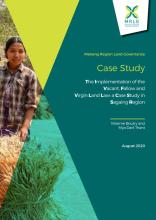Land Library Search
Bienvenido a la biblioteca de Land Portal. Explora nuestra amplia colección de recursos de acceso abierto (más de 74.000), que incluye informes, artículos de revistas científicas, trabajos de investigación, publicaciones revisadas por pares, documentos jurídicos, vídeos y mucho más.
/ library resources
Showing items 1 through 9 of 959.This Case Study looks at the implementation of the Vacant, Fallow and Virgin Lands Management Law (VFV Law) in seven villages in Sagaing Region, to assess the practices on the ground and how the law impacts the land tenure security of smallholder farmers.
This paper examines such interactions between industrial plantations and hydropower projects, demonstrating that it is the diverse livelihoods of local people – based on everyday use of multiple resources – that crucially connects aquatic and terrestrial environments.
This paper explores the divergent processes of agrarian transition in Cambodia and Vietnam and the ways in which they intersect through flows across the border, arguing that it is not possible to understand current processes of agrarian change in Cambodia without being attentive to agrarian histo
The Mekong Region Land Governance (MRLG) project, MLIKE (Mekong Land Information and Knowledge Exchange), and the Land Portal co-facilitated an online dialogue on “Responsible Large Scale Agricultural Investments in the Mekong Region” on 09-27 October 2017.
A constitutional amendment bill has been tabled before Parliament with the primary aim of overhauling the Constitutional Right to Protection from deprivation of property (Article 26).
Land area of 3131.5451 hectares in Ou Chum district, Ratanakiri province has downsized from Forest Cover 2002 and reclassified as “State Private Land” for granting purpose as communal ownership to 4 Krung indigenous communities in Puy commune, Ou Chum district, Rattanakiri province.
In the Mekong region, conflicts between local communities and large scale land concessions are widespread. They are often difficult to solve.
The ways in which people obtain land in Uganda are changing fast. Land that used to be secured through inheritance, gifts or proof of long-term occupancy is now more commonly changing hands in the market.







